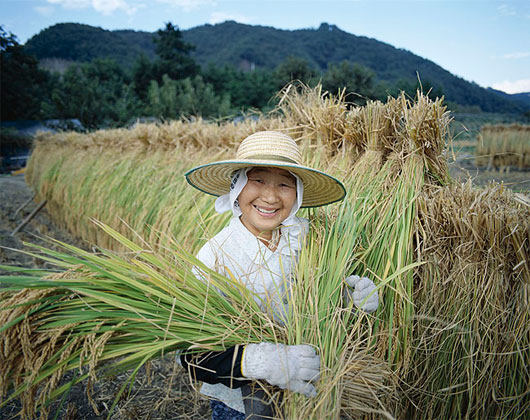Restoring the dead fields in Japan
The lands that died after the devastating effects of tsunami in Japan in 2011 have now revived and aroused life through the application of ecosystem resilience.
To revive rice fields in tsunami-ravaged areas, researchers at the Tambo NPO applied a natural farming method called "fuyumizutambo" , which reduces the impact of love. Saline intrusion due to tsunami effects, thanks to the way of utilizing the ecosystem's resilience.
The process of limiting and eliminating salty salts helps to restore rice fields applied in the Kesennuma, Shiogama and Minamisanriku areas in Miyagi Prefecture and Rikuzentakata in Iwate Prefecture. With the participation of scientists and the contribution of 1,200 volunteers, the fields are restored and allowed to harvest right in the fall of 2011.

The project has contributed to restoring dead fields affected by tsunami impacts, developing biodiversity and establishing a new sustainable economic system, helping people improve their lives.(Photo: allposters.com)
In addition to the goal of restoring agricultural activities, improving biodiversity in the natural environment, the project also established a new sustainable economic system, with the creation of a total agricultural enterprise. This includes agricultural production, processing and retail distribution activities.
According to the website of MIDORI Biodiversity Award organized by AEON Environment Fund, by scientific research and monitoring of related issues such as water quality, soil composition, biodiversity In the study, researchers have shown that agricultural lands that are devastated by natural disasters can still be revived and developed.
With great significance in the field of biodiversity, the project: "Restoring rice fields devastated by earthquakes and tsunamis by taking advantage of the ecosystem's resilience" of NPO Tambo won the Grand Pix Award for Environment in Japan in 2013. This is an annual award in Japan to honor 5 projects of organizations and individuals that have influence and contributions. certain to future biodiversity activities.
On an international scale, the award in the field of biodiversity is called MIDORI to honor individuals who make outstanding contributions to biodiversity conservation and application at the global level.
The award is aimed at activating the positive developmental influence of individuals on projects related to biodiversity worldwide and raising awareness of biodiversity.
In 2012, Professor Vo Quy became the first Vietnamese to receive a MIDORI award, with initiatives to contribute to environmental protection programs in Vietnam.
- Japan 2 years after the earthquake and tsunami disaster
- Why the dead planet?
- Learn about phone booths used to call dead people in Japan
- Unexpected facts about the Dead Sea
- 10,000 dead geese die in poisoned lakes in the United States
- Nature photos are colorful in the world
- The beautiful
- Mysterious 2,500 years in Laos jars
- Dead and alive again - The phenomenon of wonder and explanation
- Japan successfully cloned dead mouse cells
- Life in the dead land in Japan
- Great work terraced fields Hoang Su Phi water season
 Vietnam 5th Asian champion on fuel-efficient vehicles
Vietnam 5th Asian champion on fuel-efficient vehicles We can read all NASA studies completely free of charge
We can read all NASA studies completely free of charge Singer and songwriter Bob Dylan won the 2016 Nobel Prize for Literature
Singer and songwriter Bob Dylan won the 2016 Nobel Prize for Literature Scientific revolution in Asia
Scientific revolution in Asia